Northwest Florida’s natural beauty is only a pale shadow of what it once was
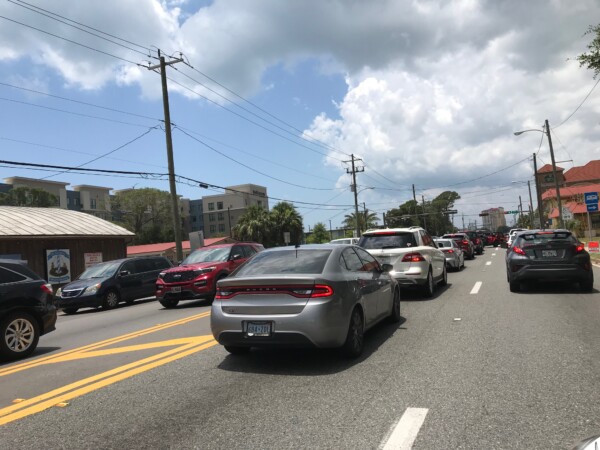
Image courtesy of Del Stone Jr.
I don’t know that I’ve ever written a cross word about Peter Bos. I’m not about to start now.
He’s a businessman, and a pretty good one at that. He’s doing what businessmen do – making money. He has made his money within the confines of the law, which is more than you can say about some of our politicians.
But when I heard about Legendary’s new nine-story “Baby Grande” development coming to Destin, I became angry – not with Mr. Bos, because again, he is simply doing what businessmen do. I hate what has happened to our community. Many of you can’t know what it was like because you weren’t here. I was. You’ll have to take my word for it when I say we’ve lost a priceless resource:
Innocence.
Destin has long since been dead. That goofy little fishing village I knew from the 1950s and ’60s ceased to exist sometime in the 1980s. The Museum of Sea and Indian, tourist traps selling baby alligators by the roadside, raw oysters tonged out of the bay that morning – all those things are gone. So are the miles and miles of beaches, clean water, snorkeling for scallops and beach bonfires and pompano big as hubcaps cruising the sandbars for sand fleas – they’re either gone or you can’t get to them because a wall of rich people and condos and big money stands in the way.
It’s too bad Eglin doesn’t give guided tours of Okaloosa Island because you need to see what the whole of the Emerald Coast looked like back then. I mean to tell you, it was beautiful. Plants grew in that white sand you couldn’t find anywhere else in the world. Animals lived there, groomed by natural selection to exist nowhere else. The smell was unique — a sharp, pine-like scent mixed with salt spray and something else, maybe the empty miles across the Gulf of Mexico.
Back then, we knew it would disappear. We knew it would be discovered, and outsiders would come in with their money and cement mixers, and all would be lost. We didn’t do anything about it, and I’m not sure why. Maybe we believed our leaders would protect our interests and keep that from happening. How could we have been so naïve?
Recently the Air Force said no to a bunch of different routes for an alternate bridge to Okaloosa Island. The Florida Department of Transportation is still trying to “fix” the traffic on U.S. Highway 98, especially the stretch through downtown Fort Walton Beach and Brooks Bridge. A second bridge was among the possible cures.
A second bridge wouldn’t fix anything. You could build a dozen bridges to Okaloosa Island – and six-lane highways, tunnels, double-decker roadways – and they wouldn’t fix anything either, because we’ve overbuilt and there’s no more room left. Every aspect of our infrastructure will be popping rivets and straining at the seams to accommodate the people.
“Baby Grande” isn’t threatening the environment because the land it sits on has already been built out. What it will do is make the roads more crowded, the restaurant lines longer, the beaches more congested, and life in general just a tiny bit more difficult for those of us who call this place home.
Destin City Councilman Chatham Morgan called it a “monstrosity” and asked, “When is enough, enough?” Apparently the answer to that question is when the land and sea are no longer available, the sky goes on the market.
So we’ve lost many of the things that made this place special. What we got in return was higher costs, congestion, and ugliness. I don’t care how beautiful the building, when it’s sitting on a plot of land that was unique and irreplaceable, well, that’s ugly.
I reiterate – I am not criticizing Mr. Bos. He has done nothing wrong.
Truth is, I’m not sure who I’m mad at. Short-sighted leaders of yesteryear? Human nature? Fate?
Or maybe just the failure to figure out a better way to make a buck than unrestrained growth. If unrestrained growth is so great, why do we spend so much time and money trying to beat cancer?
Ah well. Too late now. I’m just baying at the moon.
What little moon I can see between the towers.
This column was originally published in the May 15, 2016 edition of the Northwest Florida Daily News and is reused with permission.
About the author:
Del Stone Jr. is a professional fiction writer. He is known primarily for his work in the contemporary dark fiction field, but has also published science fiction and contemporary fantasy. Stone’s stories, poetry and scripts have appeared in publications such as Amazing Stories, Eldritch Tales, and Bantam-Spectra’s Full Spectrum. His short fiction has been published in The Year’s Best Horror Stories XXII; Alfred Hitchcock’s Mystery Magazine; the Pocket Books anthology More Phobias; the Barnes & Noble anthologies 100 Wicked Little Witch Stories, Horrors! 365 Scary Stories, and 100 Astounding Little Alien Stories; the HWA anthology Psychos; and other short fiction venues, like Blood Muse, Live Without a Net, Zombiesque and Sex Macabre. Stone’s comic book debut was in the Clive Barker series of books, Hellraiser, published by Marvel/Epic and reprinted in The Best of Hellraiser anthology. He has also published stories in Penthouse Comix, and worked with artist Dave Dorman on many projects, including the illustrated novella “Roadkill,” a short story for the Andrew Vachss anthology Underground from Dark Horse, an ashcan titled “December” for Hero Illustrated, and several of Dorman’s Wasted Lands novellas and comics, such as Rail from Image and “The Uninvited.” Stone’s novel, Dead Heat, won the 1996 International Horror Guild’s award for best first novel and was a runner-up for the Bram Stoker Award. Stone has also been a finalist for the IHG award for short fiction, the British Fantasy Award for best novella, and a semifinalist for the Nebula and Writers of the Future awards. His stories have appeared in anthologies that have won the Bram Stoker Award and the World Fantasy Award. Two of his works were optioned for film, the novella “Black Tide” and short story “Crisis Line.”
Stone recently retired after a 41-year career in journalism. He won numerous awards for his work, and in 1986 was named Florida’s best columnist in his circulation division by the Florida Society of Newspaper Editors. In 2001 he received an honorable mention from the National Lesbian and Gay Journalists Association for his essay “When Freedom of Speech Ends” and in 2003 he was voted Best of the Best in the category of columnists by Emerald Coast Magazine. He participated in book signings and awareness campaigns, and was a guest on local television and radio programs.
As an addendum, Stone is single, kills tomatoes and morning glories with ruthless efficiency, once tied the stem of a cocktail cherry in a knot with his tongue, and carries a permanent scar on his chest after having been shot with a paintball gun. He’s in his 60s as of this writing but doesn’t look a day over 94.
Contact Del at [email protected]. He is also on Facebook, twitter, Pinterest, tumblr, TikTok, and Instagram. Visit his website at delstonejr.com .
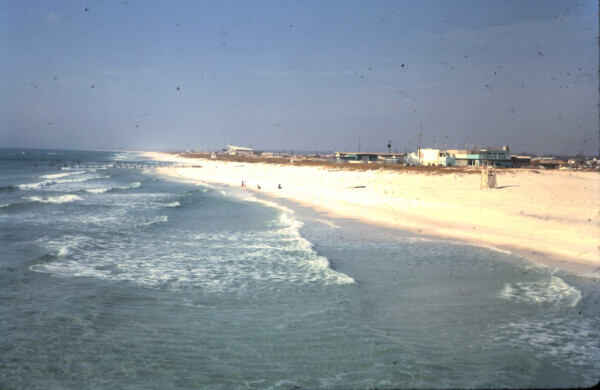
In 1964 the beach along Okaloosa Island was mostly free of condos and other buildings. This photo was taken from the Okaloosa Island fishing pier. Image courtesy of Del Stone Sr.
When it comes to the history of Fort Walton Beach, I have an unfair advantage.
Not only have I lived here a long time, but my mother’s family, the Readys, moved to the area in the 1930s. On lazy Sunday afternoons, after I’ve finished killing whatever plant it is I’m trying to grow in Mom’s yard, I sit on her front porch and listen to stories about the area’s early days.
Needless to say, life was dramatically different back then.
Mom’s family lived in a house that had electricity and a wood-burning stove but little else. The kitchen was a separate structure and water came from a well.
On laundry day, the kids would build a fire in the yard and boil their clothes in a large kettle, rinsing them three times in separate kettles. The water in that last kettle had to be free of soapy residue before the clothes could be hung up to dry.
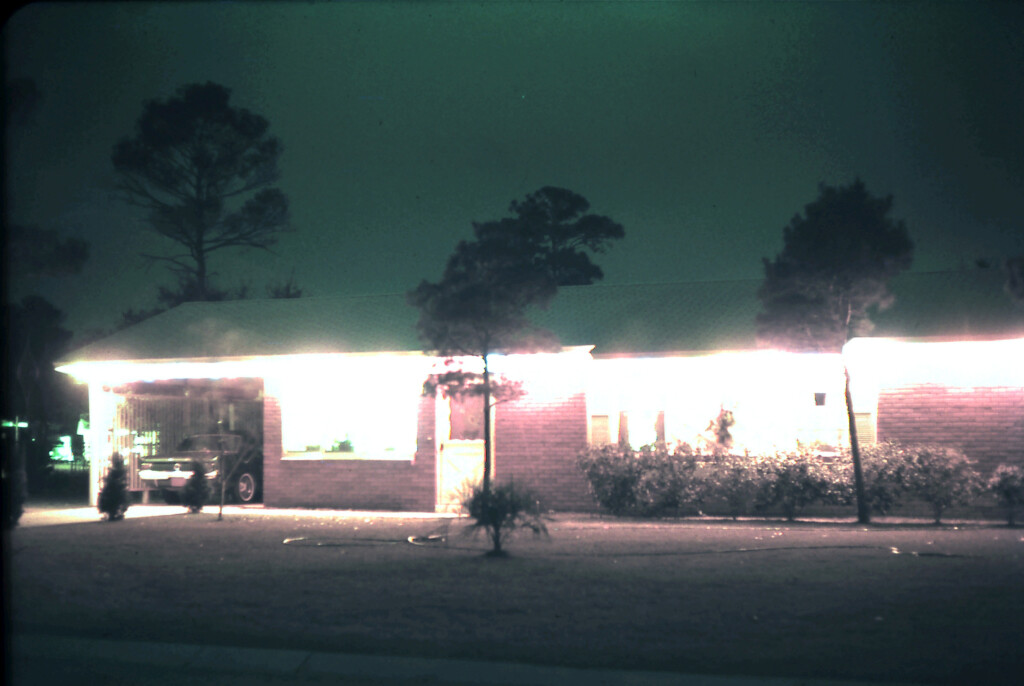
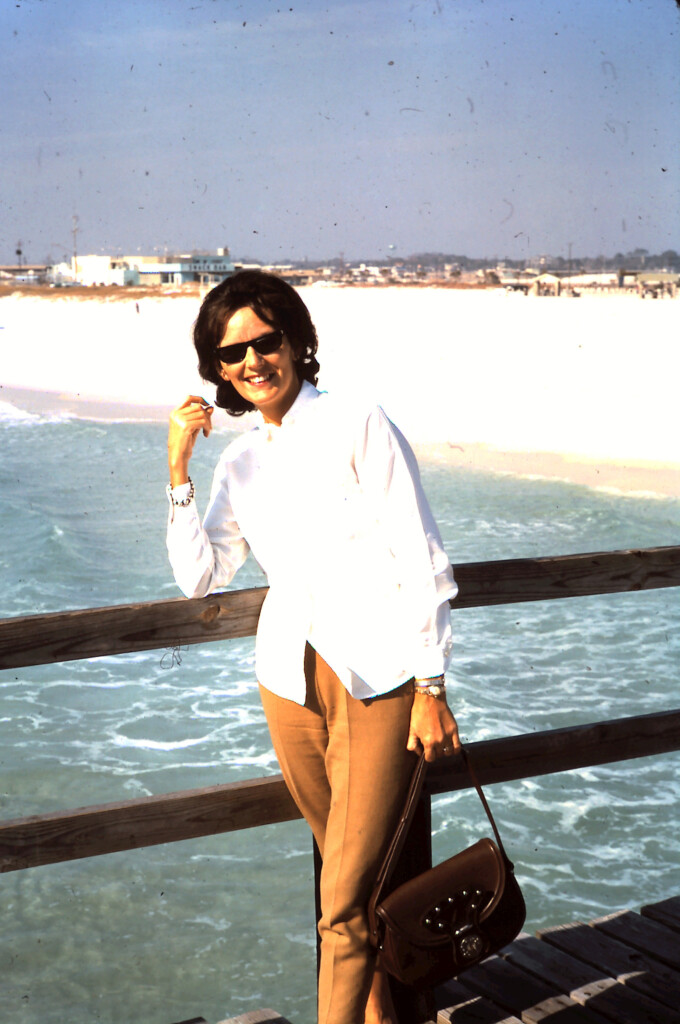
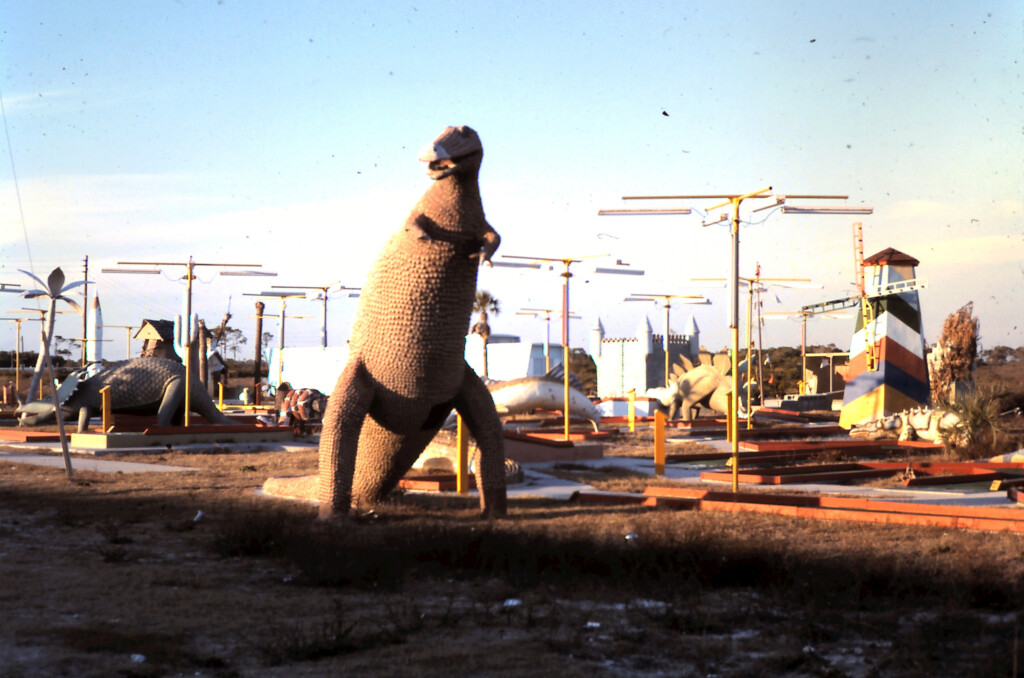
To make money, Mom and her sister, my Aunt Wendy, delivered the Pensacola newspaper on foot. They also crabbed along the shores of Choctawhatchee Bay and Santa Rosa Sound, then cleaned the crabs and sold them to the Gulfview Hotel. Grandmom made pies and cakes and sold them to the Gulfview.
Eglin Parkway was a dirt road. Deer and livestock wandered the streets of Fort Walton Beach. A cypress forest stretched from the Ferry Park area south to U.S. Highway 98 in the vicinity of Perry Avenue. It was a popular hangout for rattlesnakes.
Meanwhile, up near Cinco Bayou, alligators basked along the shoreline. Grandmom admonished the kids not to go down there where those alligators were hanging around. But it was OK to go under the house to fetch eggs from the chickens that built nests there. Sometimes a rattlesnake helped itself to those eggs, too.
The Cinco Bayou bridge was made of wood planks. Mom said that when relatives from Alabama visited, you could hear their cars crossing the bridge because the tires made a racket. The kids would then stand by the road, waiting for the relatives to pass by.
The bridge to the island was what they called a “swing bridge.” When a tall boat sailed down Santa Rosa Sound, a bridge tender would lower traffic barriers, then swing the bridge 90 degrees so the boat could pass through. Imagine how that would affect traffic today!
Bad weather tended to catch them by surprise. Mom remembers walking dirt roads and seeing fish fall from the sky. The fish were still alive. Today we know the fish were sucked up by a waterspout, but back then there was no explanation for such an event. In 1936 a hurricane struck the area. They had no warning and knew it was a hurricane only when it continuously grew worse. My Uncle Jimmy spent the storm in a cottage on Okaloosa Island. Mom, Aunt Wendy and Grandmom stayed at their house in Cinco Bayou. They even brought the cow inside to ride out the storm.
Mom was a waitress at the bus station before going to work at the Tringas Theater. During World War II, she said, they passed around a collection jar among the audience members to raise money for armaments.
She met my dad when he was stationed at Eglin. Dad was a pilot, and Mom said he would buzz their house, causing Granddad to stomp outside and shake his fist at the sky. Dad once took Mom on a joyride and performed acrobatics; Mom was not amused.
Eventually growth would come to the area, with improved roads and bridges. More people moved to Fort Walton and Mom moved away, following Dad and his career in the Army Air Corps, then the U.S. Air Force. When it came time for Dad to retire, the family moved back to Fort Walton, and here we’ve been ever since.
As a longtime resident, I am not in favor of dirt roads and alligators sharing my swimming area. But at the same time, I’m not in favor of traffic jams and blocked beaches. I realize change is inevitable, but I wish it could be change we’ll all benefit from.
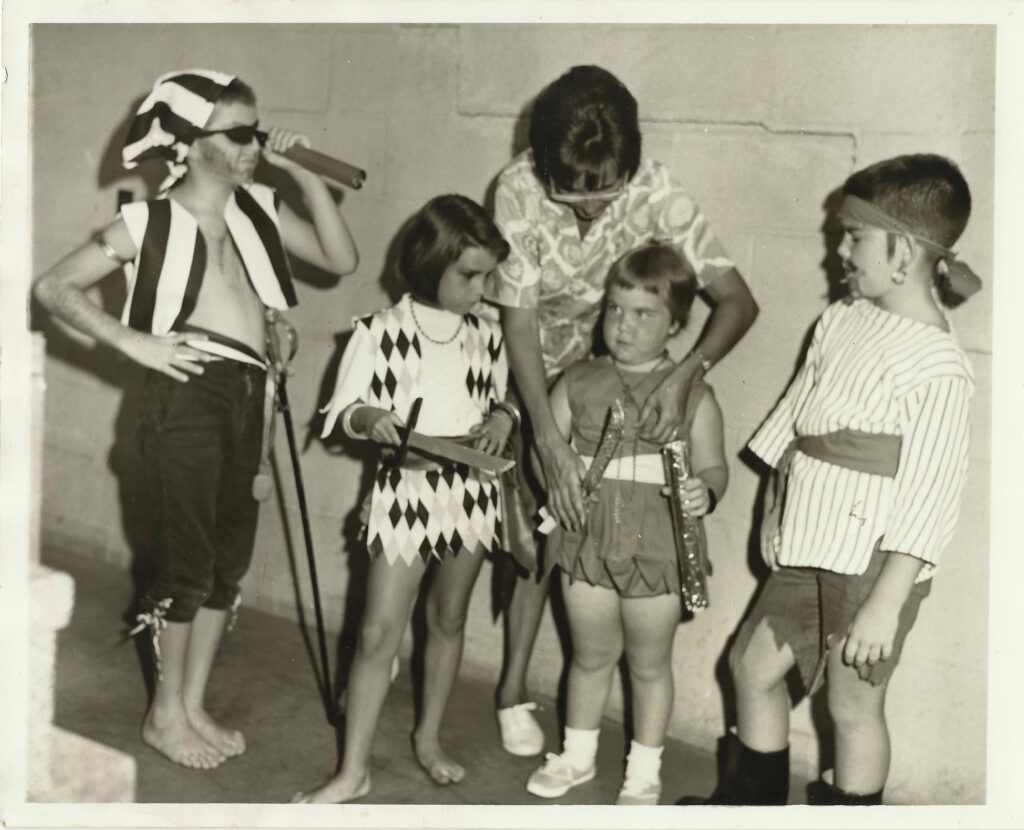
About the author:
Del Stone Jr. is a professional fiction writer. He is known primarily for his work in the contemporary dark fiction field, but has also published science fiction and contemporary fantasy. Stone’s stories, poetry and scripts have appeared in publications such as Amazing Stories, Eldritch Tales, and Bantam-Spectra’s Full Spectrum. His short fiction has been published in The Year’s Best Horror Stories XXII; Alfred Hitchcock’s Mystery Magazine; the Pocket Books anthology More Phobias; the Barnes & Noble anthologies 100 Wicked Little Witch Stories, Horrors! 365 Scary Stories, and 100 Astounding Little Alien Stories; the HWA anthology Psychos; and other short fiction venues, like Blood Muse, Live Without a Net, Zombiesque and Sex Macabre. Stone’s comic book debut was in the Clive Barker series of books, Hellraiser, published by Marvel/Epic and reprinted in The Best of Hellraiser anthology. He has also published stories in Penthouse Comix, and worked with artist Dave Dorman on many projects, including the illustrated novella “Roadkill,” a short story for the Andrew Vachss anthology Underground from Dark Horse, an ashcan titled “December” for Hero Illustrated, and several of Dorman’s Wasted Lands novellas and comics, such as Rail from Image and “The Uninvited.” Stone’s novel, Dead Heat, won the 1996 International Horror Guild’s award for best first novel and was a runner-up for the Bram Stoker Award. Stone has also been a finalist for the IHG award for short fiction, the British Fantasy Award for best novella, and a semifinalist for the Nebula and Writers of the Future awards. His stories have appeared in anthologies that have won the Bram Stoker Award and the World Fantasy Award. Two of his works were optioned for film, the novella “Black Tide” and short story “Crisis Line.”
Stone recently retired after a 41-year career in journalism. He won numerous awards for his work, and in 1986 was named Florida’s best columnist in his circulation division by the Florida Society of Newspaper Editors. In 2001 he received an honorable mention from the National Lesbian and Gay Journalists Association for his essay “When Freedom of Speech Ends” and in 2003 he was voted Best of the Best in the category of columnists by Emerald Coast Magazine. He participated in book signings and awareness campaigns, and was a guest on local television and radio programs.
As an addendum, Stone is single, kills tomatoes and morning glories with ruthless efficiency, once tied the stem of a cocktail cherry in a knot with his tongue, and carries a permanent scar on his chest after having been shot with a paintball gun. He’s in his 60s as of this writing but doesn’t look a day over 94.
Contact Del at [email protected]. He is also on Facebook, twitter, Pinterest, tumblr, TikTok, and Instagram. Visit his website at delstonejr.com .
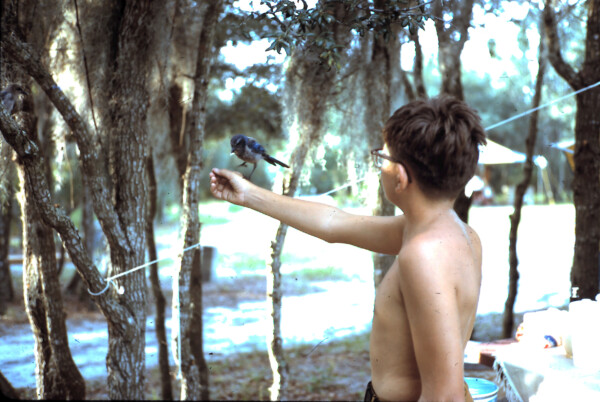
The author poses with a scrub jay in this photo that was taken in the 1970s during a Stone family vacation. Image courtesy of Delmar S. Stone Sr.
Every time I speak against the rising swell of pollution, congestion and destruction that is overwhelming the Asphalt Coast, quivering snouts emerge from the quagmire to squeal for pearls.
“Show us the numbers,” they demand, and then they cast forth their own numbers – of new slave-labor jobs created, of new taco-burger-pizza stands thrown together, of cubic yards of earth scabbed by asphalt, as if these cold calculations were the sum of all things.
Thank God they are not.
In reality, the finest things are those which cannot be enumerated by the appraiser’s cool eye: beauty, serenity, peace of mind.
These are priceless, and to demand that a monetary value be stamped upon them, as if they were plastic widgets fished from the clearance bin at a discount store, is to murder them all the other intangibles that make life worth living.
A bird, for instance. In central Florida, you stroll through oak hammocks and bird called a scrub jay will swoop down and perch on your hand and look you in the eye.
Wild birds that are unafraid of man. Isn’t that something?
Scrub jays are close to extinction now, because the oak hammocks have been paved over with strip shopping centers to house more out-of-business video stores.
Is it so all-fired important that you be able to rent “Naked Bimbos from Uranus” at every street corner? Is a video store worth the loss of a bird?
Or a fish – have you seen the water froth as feeding blues slash through schools of frenzied alewife, a scene bathed in the ruddy glow of a distant thunderstorm illuminated by the sailor’s delight of a setting sun?
Now, the murky water carries an oily sheen, and the froth is caused by personal watercraft screaming across its surface.
How much does a fish cost? How much does a pretty scene fetch on the open market?
What is the price of silence? I’ve stood in the forest, where you can hear the nodding of trees, the clouds sailing overhead, the ocean of air. This is the sound of sanity, where dreams are born. How much do you pay for your dreams?
To the privileged few, these things are no more important than what they can be sold for. Such are the wages of “growth.” If it puts money in their pockets it’s good, even if it takes away from everything else.
Most people would call that arrogance. We don’t need arrogance.
What we do need is a less practical but more useful emotion.
On cloudless nights I have gone out and looked up and understood without a word that I am a small thing in a very big universe. The humility is like coming home.
That’s what we need.
To understand the only true measure of prosperity is happiness. Any person, or any thing, which measures its prosperity by “growth” is doomed.
Zelda Fitzgerald said that no one, not even poets, has measured how much a heart can hold.
Yet the squealing for pearls goes on.
How awful, that these shallow and dreamless creatures would rule the world.
This column was originally published in the Northwest Florida Daily News on May 6, 1998 and is used with permission.
About the author:
Del Stone Jr. is a professional fiction writer. He is known primarily for his work in the contemporary dark fiction field, but has also published science fiction and contemporary fantasy. Stone’s stories, poetry and scripts have appeared in publications such as Amazing Stories, Eldritch Tales, and Bantam-Spectra’s Full Spectrum. His short fiction has been published in The Year’s Best Horror Stories XXII; Alfred Hitchcock’s Mystery Magazine; the Pocket Books anthology More Phobias; the Barnes & Noble anthologies 100 Wicked Little Witch Stories, Horrors! 365 Scary Stories, and 100 Astounding Little Alien Stories; the HWA anthology Psychos; and other short fiction venues, like Blood Muse, Live Without a Net, Zombiesque and Sex Macabre. Stone’s comic book debut was in the Clive Barker series of books, Hellraiser, published by Marvel/Epic and reprinted in The Best of Hellraiser anthology. He has also published stories in Penthouse Comix, and worked with artist Dave Dorman on many projects, including the illustrated novella “Roadkill,” a short story for the Andrew Vachss anthology Underground from Dark Horse, an ashcan titled “December” for Hero Illustrated, and several of Dorman’s Wasted Lands novellas and comics, such as Rail from Image and “The Uninvited.” Stone’s novel, Dead Heat, won the 1996 International Horror Guild’s award for best first novel and was a runner-up for the Bram Stoker Award. Stone has also been a finalist for the IHG award for short fiction, the British Fantasy Award for best novella, and a semifinalist for the Nebula and Writers of the Future awards. His stories have appeared in anthologies that have won the Bram Stoker Award and the World Fantasy Award. Two of his works were optioned for film, the novella “Black Tide” and short story “Crisis Line.”
Stone recently retired after a 41-year career in journalism. He won numerous awards for his work, and in 1986 was named Florida’s best columnist in his circulation division by the Florida Society of Newspaper Editors. In 2001 he received an honorable mention from the National Lesbian and Gay Journalists Association for his essay “When Freedom of Speech Ends” and in 2003 he was voted Best of the Best in the category of columnists by Emerald Coast Magazine. He participated in book signings and awareness campaigns, and was a guest on local television and radio programs.
As an addendum, Stone is single, kills tomatoes and morning glories with ruthless efficiency, once tied the stem of a cocktail cherry in a knot with his tongue, and carries a permanent scar on his chest after having been shot with a paintball gun. He’s in his 60s as of this writing but doesn’t look a day over 94.
Contact Del at [email protected]. He is also on Facebook, twitter, Pinterest, tumblr, TikTok, and Instagram. Visit his website at delstonejr.com .
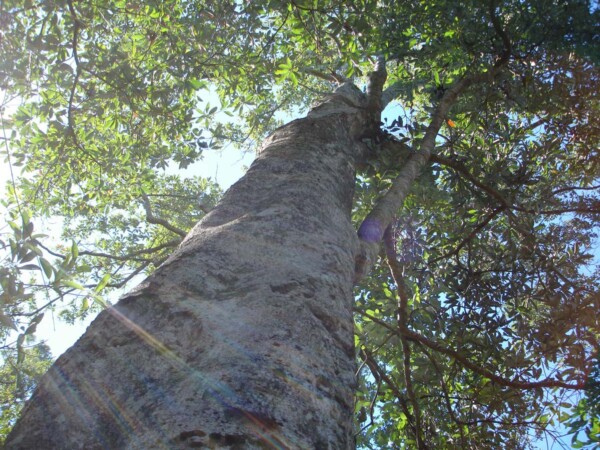
Image courtesy of Del Stone Jr.
Got lots of interesting feedback from last week’s epistle about trees.
Okaloosa planning manager Pat Blackshear agreed that tree preservation is a good thing and said the county is trying to stop the kind of thing that happened on Racetrack Road from happening again. Good luck, Pat.
Another reader sent a clipping: Toyota is developing an experimental tree that eats a higher percentage of the toxic gack emitted by cars. They want to plant these tress along Japan’s highways to soak up more CO2.
Gayle Melich of Niceville sent an ad that appeared in The New Yorker for the New Hampshire Office of Travel and Tourism Development. It read: “More than 6,000 miles of pathways and not one drop of cement.” Now there’s a sentiment to rattle the tar vendors along the Asphalt Coast.
[ Oh, joy, oh rapture. More growth ]
And a Navarre reader suggested the following remediations:
1. Tree ordinances.
2. Reward businesses that build on previously developed property (like Office Maxx).
3. Increase fees for clearing land.
4. Step up educational efforts.
5. The Daily News could place newspaper recycling bins in elementary schools and reward those schools that collect the most paper.
Speaking of trees, the National Arbor Day Foundation has a booklet out called “What Tree Is That?” It’s a pocket guide for identifying trees.
Everybody’s talking about a convention center on Okaloosa Island.
Politicians. Tourism officials. Island businessman.
Kelly Humphrey, in a May 31 MoneySense article, quoted Ramada Beach Resort GM Werner Brielmayer as saying, “We’re building a convention center here,” and the Florida Legislature even passed a law providing bed tax money for a convention center.
Sounds like it’s a done deal, except for one teensy, weensy problem.
Last time county commissioners brought up the subject, angry mobs turned out to give ’em hell (way to go, Joe!). Since then, readers have been calling, writing and e-mailing me to say:
We don’t want a convention center. We don’t want the congestion. We don’t want the pollution. We don’t want the traffic.
And we sure as heck don’t want the bill.
What’s next? Will the CRA, which has had more stakes pounded through its heart than Dracula, be pushing for a parallel bridge to relieve all the convention center road crowding? Don’t laugh. It could happen.
People have said they don’t want this thing. Is it the money that’s talking now?
Got a tongue-in-cheek letter from a Mystery Author about surly babies in public places.
This person equated the defense of misbehaving kiddies with the crucifixion of smokers who light up in public.
At the end of his letter, Mystery Author warned that next time he sees a kid acting up in public and Mommy or Daddy doesn’t do something about it, he’ll give the kid a cigarette!
Better watch out, Mystery Author! You’ll have the ATF and the CF at your door. Maybe even the CRA!
This column was originally published in the June 24, 1998 edition of the Northwest Florida Daily News and is used with permission
About the author:
Del Stone Jr. is a professional fiction writer. He is known primarily for his work in the contemporary dark fiction field, but has also published science fiction and contemporary fantasy. Stone’s stories, poetry and scripts have appeared in publications such as Amazing Stories, Eldritch Tales, and Bantam-Spectra’s Full Spectrum. His short fiction has been published in The Year’s Best Horror Stories XXII; Alfred Hitchcock’s Mystery Magazine; the Pocket Books anthology More Phobias; the Barnes & Noble anthologies 100 Wicked Little Witch Stories, Horrors! 365 Scary Stories, and 100 Astounding Little Alien Stories; the HWA anthology Psychos; and other short fiction venues, like Blood Muse, Live Without a Net, Zombiesque and Sex Macabre. Stone’s comic book debut was in the Clive Barker series of books, Hellraiser, published by Marvel/Epic and reprinted in The Best of Hellraiser anthology. He has also published stories in Penthouse Comix, and worked with artist Dave Dorman on many projects, including the illustrated novella “Roadkill,” a short story for the Andrew Vachss anthology Underground from Dark Horse, an ashcan titled “December” for Hero Illustrated, and several of Dorman’s Wasted Lands novellas and comics, such as Rail from Image and “The Uninvited.” Stone’s novel, Dead Heat, won the 1996 International Horror Guild’s award for best first novel and was a runner-up for the Bram Stoker Award. Stone has also been a finalist for the IHG award for short fiction, the British Fantasy Award for best novella, and a semifinalist for the Nebula and Writers of the Future awards. His stories have appeared in anthologies that have won the Bram Stoker Award and the World Fantasy Award. Two of his works were optioned for film, the novella “Black Tide” and short story “Crisis Line.”
Stone recently retired after a 41-year career in journalism. He won numerous awards for his work, and in 1986 was named Florida’s best columnist in his circulation division by the Florida Society of Newspaper Editors. In 2001 he received an honorable mention from the National Lesbian and Gay Journalists Association for his essay “When Freedom of Speech Ends” and in 2003 he was voted Best of the Best in the category of columnists by Emerald Coast Magazine. He participated in book signings and awareness campaigns, and was a guest on local television and radio programs.
As an addendum, Stone is single, kills tomatoes and morning glories with ruthless efficiency, once tied the stem of a cocktail cherry in a knot with his tongue, and carries a permanent scar on his chest after having been shot with a paintball gun. He’s in his 60s as of this writing but doesn’t look a day over 94.
Contact Del at [email protected]. He is also on Facebook, twitter, Pinterest, tumblr, TikTok, and Instagram. Visit his website at delstonejr.com .
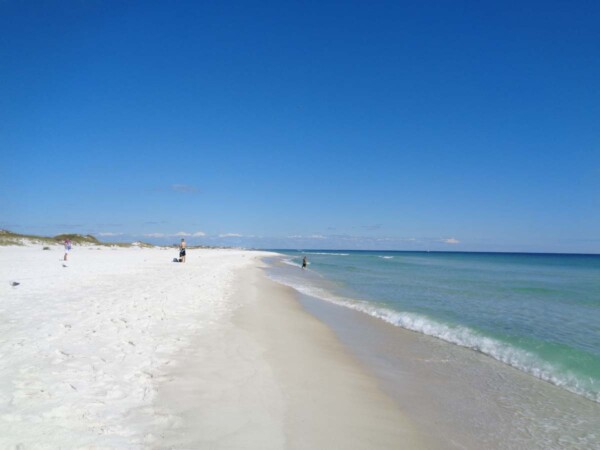
Once upon a time the beautiful beaches of Northwest Florida were freely accessible by the public. They're still beautiful - if you can get to them. Image courtesy of Del Stone Jr.
In the shadow of Pride Week and Earth Day, you too could have spent your Saturday creeping bumper-to-bumper through Destin on your way to an oil-stained beach lined with murky brown water.
Ah, the rewards of growth. Praise the Lord and pass the asphalt.
When we speak of growth, we speak of rights – the right to live where we choose, to own our land, to procreate as we please.
Procreation might be the ultimate right, observed and respected by virtually every culture, with the exception of China.
You’ve got to give the Chinese credit. They understand that resources are limited and that uncontrolled growth threatens not only the snail darters of the world, but the imperious privileged who fan their wattles on the veranda of the bistro as they suck down those little umbrella-festooned cocktails.
Sorry to tell you this, Chaz, but the more people you got, the fewer “rights” you got. It can’t work any other way.
If people are so all-fired concerned about “rights,” maybe they’d agree to forego just one right – the right to reproduce the human race into extinction.
Imagine, for instance, how better life might be if 180 million fewer peopled lived between the shores of the United States.
Unemployment would be lower than it is already. Work would be plentiful, and everybody who wanted one could have a job.
Children would receive personalized education because classrooms would be less crowded. These better-educated children would grow up to become better parents, better workers and better members of society.
The pressure and pace of life would diminish. Kick back and enjoy the quiet, the fresh air, and the serenity that happens when society’s manic pace is shut away.
We’d have to bulldoze many of the existing structures. Bye bye, convenience stores on every corner. Bye bye, strip shopping centers. Bye bye, gross wings stores. How sad.
Once those structures were gone, we could set about restoring the land to what it was. We’d plant native trees, shrubs and grasses. Nature would do the rest. The small animals would move in first, then the larger ones. There’d be deer, and yes, there’d be bears. We’d have to be careful.
But the benefits would outweigh the disadvantages. The weather would return to normal. No more freakish El Nino winters, and freakish hurricane summers.
With the watershed restored, Choctawhatchee Bay would clear up. Grass beds would regrow. Fish would become more plentiful.
The gulf would become emerald again. The sand would glisten whitely. Those awful seaweed blooms would become a thing of the past.
Our energy sources would go further, as would our natural resources.
Most importantly, we would become human beings again, not the frustrated, angry, self-destructive rats in a case that we’ve become.
We can go on as we are, giving up more and more of our rights and living at a lower and lower standard. Or maybe we could relinquish a single right and enjoy the future benefits of moderation.
It’s something to think about as you’re trapped in gridlock, staring at the murky brown waters.
This column was originally published in the April 15, 1998 edition of the Northwest Florida Daily News and is used with permission.
About the author:
Del Stone Jr. is a professional fiction writer. He is known primarily for his work in the contemporary dark fiction field, but has also published science fiction and contemporary fantasy. Stone’s stories, poetry and scripts have appeared in publications such as Amazing Stories, Eldritch Tales, and Bantam-Spectra’s Full Spectrum. His short fiction has been published in The Year’s Best Horror Stories XXII; Alfred Hitchcock’s Mystery Magazine; the Pocket Books anthology More Phobias; the Barnes & Noble anthologies 100 Wicked Little Witch Stories, Horrors! 365 Scary Stories, and 100 Astounding Little Alien Stories; the HWA anthology Psychos; and other short fiction venues, like Blood Muse, Live Without a Net, Zombiesque and Sex Macabre. Stone’s comic book debut was in the Clive Barker series of books, Hellraiser, published by Marvel/Epic and reprinted in The Best of Hellraiser anthology. He has also published stories in Penthouse Comix, and worked with artist Dave Dorman on many projects, including the illustrated novella “Roadkill,” a short story for the Andrew Vachss anthology Underground from Dark Horse, an ashcan titled “December” for Hero Illustrated, and several of Dorman’s Wasted Lands novellas and comics, such as Rail from Image and “The Uninvited.” Stone’s novel, Dead Heat, won the 1996 International Horror Guild’s award for best first novel and was a runner-up for the Bram Stoker Award. Stone has also been a finalist for the IHG award for short fiction, the British Fantasy Award for best novella, and a semifinalist for the Nebula and Writers of the Future awards. His stories have appeared in anthologies that have won the Bram Stoker Award and the World Fantasy Award. Two of his works were optioned for film, the novella “Black Tide” and short story “Crisis Line.”
Stone recently retired after a 41-year career in journalism. He won numerous awards for his work, and in 1986 was named Florida’s best columnist in his circulation division by the Florida Society of Newspaper Editors. In 2001 he received an honorable mention from the National Lesbian and Gay Journalists Association for his essay “When Freedom of Speech Ends” and in 2003 he was voted Best of the Best in the category of columnists by Emerald Coast Magazine. He participated in book signings and awareness campaigns, and was a guest on local television and radio programs.
As an addendum, Stone is single, kills tomatoes and morning glories with ruthless efficiency, once tied the stem of a cocktail cherry in a knot with his tongue, and carries a permanent scar on his chest after having been shot with a paintball gun. He’s in his 60s as of this writing but doesn’t look a day over 94.
Contact Del at [email protected]. He is also on Facebook, twitter, Pinterest, tumblr, TikTok, and Instagram. Visit his website at delstonejr.com .
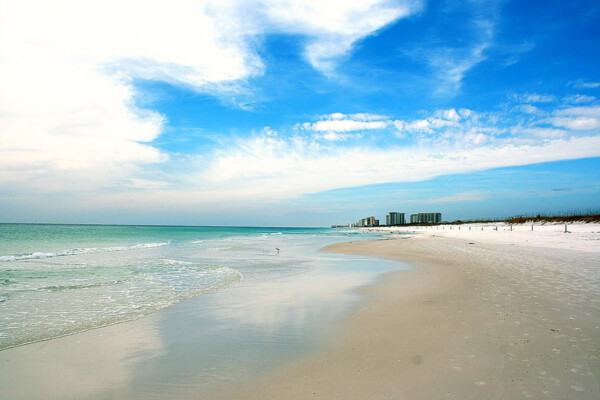
Image courtesy of Flickr user Gloria Manna by way of a Creative Commons license. https://www.flickr.com/photos/gloriamanna/
It’s a question of quality: The Hap-Hap-Happy News at the top of Friday’s Daily News left me with a lump in my throat.
“Economist: Emerald Coast to grow for next 15 years.”
I managed not to throw up as I read this epitaph.
It was delivered by Orlando-based economist Henry Fishkind, who predicted the Northwest Florida area would experience continued development well into the next century.
Oh joy, oh rapture.
Judging by what passes for “development” in this area, we can expect a plethora of strip shopping centers, gas/convenience stores, and fast food outlets.
This is good news – if you’re a developer, a construction worker or a taco/burger/pizza flipper. Life here along the Asphalt Coast will be splendid. The rich will get richer, and the poor will get trucked in like galley slaves to do the scutwork. Sound familiar, Destin and South Walton?
While the tiny minority that profits from this rapacious consumption clinks cocktail glasses behind the walls of “gated communities” (another word for “fortress”) the rest of us will be living in an ugly, polluted and congested hog swill that we once called “paradise.”
Somebody will surely say tome, “You got yours, and now you want to slam the door on anybody else coming here.”
Absolutely right. Truth is, you can’t put 100 people in a room that only holds 50. The 50 who got there first have every right to complain when the door isn’t shut.
The destruction of the Emerald Coast and the rise of the Asphalt Coast is a refrain heard all over this country, yet we refuse to learn that prosperity need not be a function of “growth.” Many cultures prospered without laying waste to everything around them.
What is the point of life without loveliness?
Heaven or hell? It would be nice if somebody with a sense of humor responded to our heaven-and-hell write-in being sponsored by the Lifestyle department. So far, we’ve gotten mostly Old Testament pronouncements of doom, and a couple of really bizarre letters from some nutcase in Andalusia.
C’mon, folks. We want this to be fun!
A tragedy that should have been averted: Recently four girls in New York were killed when a tree fell on their school bus.
Soon after, the Daily News received a press release from the National Arborist Association, which read:
“The recent tragedy in Laurelton, Queens, N.Y., where four girls died when a tree fell on their school bus was an accident that could have been averted had the tree received the professional care of an arborist.” The press release went on to describe all the marvelous things arborists do for people with trees.
Excuse me, but does anybody else find this press release to be a ghoulish and tasteless exploitation of an accident? Sort of like a tire manufacturer videotaping fatal accidents and saying, “They should’ve been using OUR steel-belted radials.”
Words that should be words: “Disconfect,” as in: To sterilize the piece of candy you dropped on the floor by blowing on it, assuming this will somehow “remove” all the germs.
This column was originally published in the March 19, 1997 edition of the Northwest Florida Daily News and is used with permission.
About the author:
Del Stone Jr. is a professional fiction writer. He is known primarily for his work in the contemporary dark fiction field, but has also published science fiction and contemporary fantasy. Stone’s stories, poetry and scripts have appeared in publications such as Amazing Stories, Eldritch Tales, and Bantam-Spectra’s Full Spectrum. His short fiction has been published in The Year’s Best Horror Stories XXII; Alfred Hitchcock’s Mystery Magazine; the Pocket Books anthology More Phobias; the Barnes & Noble anthologies 100 Wicked Little Witch Stories, Horrors! 365 Scary Stories, and 100 Astounding Little Alien Stories; the HWA anthology Psychos; and other short fiction venues, like Blood Muse, Live Without a Net, Zombiesque and Sex Macabre. Stone’s comic book debut was in the Clive Barker series of books, Hellraiser, published by Marvel/Epic and reprinted in The Best of Hellraiser anthology. He has also published stories in Penthouse Comix, and worked with artist Dave Dorman on many projects, including the illustrated novella “Roadkill,” a short story for the Andrew Vachss anthology Underground from Dark Horse, an ashcan titled “December” for Hero Illustrated, and several of Dorman’s Wasted Lands novellas and comics, such as Rail from Image and “The Uninvited.” Stone’s novel, Dead Heat, won the 1996 International Horror Guild’s award for best first novel and was a runner-up for the Bram Stoker Award. Stone has also been a finalist for the IHG award for short fiction, the British Fantasy Award for best novella, and a semifinalist for the Nebula and Writers of the Future awards. His stories have appeared in anthologies that have won the Bram Stoker Award and the World Fantasy Award. Two of his works were optioned for film, the novella “Black Tide” and short story “Crisis Line.”
Stone recently retired after a 41-year career in journalism. He won numerous awards for his work, and in 1986 was named Florida’s best columnist in his circulation division by the Florida Society of Newspaper Editors. In 2001 he received an honorable mention from the National Lesbian and Gay Journalists Association for his essay “When Freedom of Speech Ends” and in 2003 he was voted Best of the Best in the category of columnists by Emerald Coast Magazine. He participated in book signings and awareness campaigns, and was a guest on local television and radio programs.
As an addendum, Stone is single, kills tomatoes and morning glories with ruthless efficiency, once tied the stem of a cocktail cherry in a knot with his tongue, and carries a permanent scar on his chest after having been shot with a paintball gun. He’s in his 60s as of this writing but doesn’t look a day over 94.
Contact Del at [email protected]. He is also on Facebook, twitter, Pinterest, tumblr, TikTok, Ello and Instagram. Visit his website at delstonejr.com .